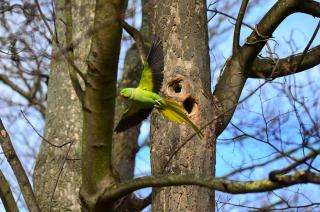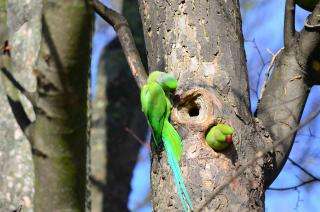Researchers aim to understand impacts of invasive parrots

A new research network which aims to understand the problems caused by parrots that have invaded cities has been launched by the University of Kent's Durrell Institute of Conservation and Ecology (DICE).
Comprising researchers from Kent, Imperial College, London, and other UK partners, alongside scientists from Europe and beyond, the 4-year research network – PARROTNET – will provide opportunities for researchers to discuss and explore the invasion dynamics, risks to agriculture, and societal problems posed by what are known as invasive parrots.
The launch was marked by a workshop in Canterbury, 10-12 February 2014.
PARROTNET aims to better understand why species such as parrots are highly successful invaders. It will also explore ways to monitor and predict the various impacts, including the economic and ecological, of these species across Europe, and the means to mitigate them.
In the UK and across Europe, rose-ringed parakeets – a species of parrot - have begun to pose problems in urban and rural areas such as disturbance to humans, competition with native wildlife and, increasingly, as an agricultural pest, already prompting changes in national policies.
Rose-ringed parakeets are thought to have originally colonised the UK in the 1970s from a few escaped pet birds; now they are one of the UK's fastest growing bird populations, numbering more than 32,000 individuals. In Kent, parakeets are well-known in areas of Margate and Broadstairs.

Dr Jim Groombridge, Reader in Biodiversity Conservation from DICE and Chair of PARROTNET, said: 'The rose-ringed parakeet is listed amongst the top 100 worst alien species in Europe, and since the 1970s has rapidly established itself in over 100 cities across the continent and beyond, with recent evidence of explosive population growth in some regions of Europe. Given the extent of this problem we expect that our findings will be of interest to both policy-makers and the general public.'
The network will also create a virtual European Monitoring Centre, based at the University of Kent, for all invasive parrot species, as well as transfer results to policy and society.
Provided by University of Kent


















